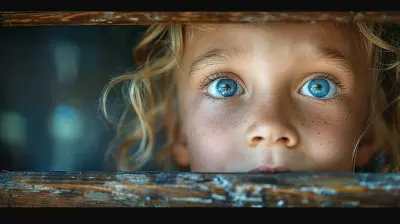Health Education for Young Children: Teaching the Basics Early
4 May 2025
Health education is one of the most valuable gifts we can give to our children. It’s like planting seeds in a garden early, ensuring they grow into strong, healthy individuals who make informed choices throughout their lives. But let’s be real: teaching kids about health is not a one-size-fits-all approach. It’s a delicate balance of providing the right information, making it fun, and, most importantly, starting early. So, how do we teach young children about health in a way that sticks? Let’s dive into the basics and explore why it’s so important to introduce health education right from the start.

Why Health Education Matters for Young Children
Let’s think about it for a second. Imagine a world where children grow up understanding how to take care of their bodies, minds, and emotions. This sounds pretty ideal, right? Well, that’s the goal of health education for young children. When kids are taught the basics about health, they’re more likely to develop healthy habits that last a lifetime.But it's not just about physical health. Health education also touches on mental and emotional well-being, helping children learn how to navigate their feelings, manage stress, and build positive relationships. In today’s fast-paced world, these tools are more important than ever.
Building a Foundation for Lifelong Health
Health education helps build a solid foundation for kids. Just like teaching them to read or do math, teaching kids about their health sets them up for success. When they understand how their bodies work, they’re more likely to take care of them. And when they learn how to express their emotions, they’re better equipped to handle the ups and downs of life.Starting early is key. Young children are like sponges—they absorb everything around them. By introducing health concepts at an early age, we can mold their outlook on health in a positive way, ensuring these lessons become second nature as they grow older.

The Core Components of Health Education for Young Children
When it comes to teaching young kids about health, it’s important to break it down into digestible, age-appropriate chunks. After all, you wouldn’t hand a kindergartener a medical textbook and expect them to understand it, right? Here are the core components of health education that can be introduced early on:1. Personal Hygiene
Let’s start with the basics: cleanliness. Teaching young children about personal hygiene is one of the first steps toward health education. Simple tasks like washing hands, brushing teeth, and bathing regularly are essential habits that kids need to learn early on.But how do you make it fun? Turn it into a game! You could sing songs while they wash their hands or set a timer for brushing their teeth. It’s all about making these routines feel less like chores and more like fun activities they look forward to.
2. Nutrition and Healthy Eating
Nutrition is another biggie when it comes to health education. Kids need to understand that what they put into their bodies affects how they feel, grow, and function. But let’s be honest—explaining nutrition to a five-year-old isn’t always easy.One approach is to introduce the concept of "eating a rainbow." Encourage children to eat a variety of colorful fruits and vegetables, explaining how each color helps their body in different ways. For example, orange carrots are good for their eyes, and green spinach helps them grow strong muscles.
You can also involve them in meal preparation. Kids are more likely to eat healthy foods if they’ve had a hand in making them. Plus, it’s a great opportunity to sneak in some lessons about food groups, portion sizes, and the importance of drinking water.
3. Physical Activity
We all know how much energy young children have. They’re constantly on the move, and that’s a good thing! Physical activity is crucial for their growth and development, and health education should emphasize the importance of staying active.But here’s the trick: kids don’t need structured workouts like adults do. Instead, encourage play. Whether it’s running around outside, playing tag, or dancing to their favorite songs, the goal is to get them moving and teach them that being active is fun.
You can also introduce activities that help develop coordination and motor skills, like hopping on one foot, balancing, or throwing a ball. These might seem like simple games, but they lay the groundwork for a lifetime of physical fitness.
4. Emotional Health and Mindfulness
Health isn’t just about the body—mental and emotional well-being are just as important. Children need to learn how to recognize their feelings and express them in healthy ways. This is where emotional health education comes in.One effective way to teach emotional health is through storytelling. Read books together that explore different emotions, like sadness, anger, or joy, and talk about how the characters feel. You can even ask your child to reflect on times when they felt the same way and discuss how to handle those emotions.
Mindfulness exercises are another great tool. Simple practices like deep breathing or visualizing a calm place can help children manage stress and anxiety, even at a young age. It’s all about giving them the tools to navigate life’s challenges with resilience and confidence.

Making Health Education Engaging and Fun
So, how do you keep kids engaged while teaching these essential health lessons? After all, we’re competing with video games, cartoons, and a million other distractions. The key is to make health education interactive and fun.1. Use Games and Activities
Children learn best when they’re having fun. Turn health education into a game by using activities that reinforce the lessons you’re teaching. For example, you could play a “healthy foods scavenger hunt” around the house, where your child finds items that fit into different food groups. Or, create a “hygiene relay race” where they have to wash their hands, brush their teeth, and tidy their room in record time.2. Incorporate Technology
Let’s face it—kids love screens. So why not use that to your advantage? There are tons of kid-friendly apps and videos that teach health concepts in a fun and engaging way. From interactive games about healthy eating to animated videos about brushing teeth, there’s no shortage of resources to help reinforce these lessons.3. Be a Role Model
Kids are great imitators. If they see you practicing healthy habits, they’re more likely to follow suit. Make a point to model the behaviors you want them to learn. Whether it’s choosing nutritious snacks, exercising regularly, or managing stress in healthy ways, your actions speak louder than words.4. Use Visual Aids
For young children, seeing is believing. Use charts, pictures, or even toys to help explain health concepts. For example, you could create a “healthy habits” chart where your child gets a sticker each time they complete a task like brushing their teeth or eating a vegetable. Visual aids make abstract concepts more concrete and easier to understand.
The Long-Term Benefits of Health Education
We’ve talked a lot about the here and now, but what about the long-term impact of teaching young children about health? Well, the benefits are huge. Children who receive health education early on are more likely to:- Develop healthy habits: Whether it’s eating well, exercising regularly, or practicing good hygiene, these habits become second nature when taught at a young age.
- Make informed choices: As they grow older, children who understand health concepts are better equipped to make informed decisions. They’ll know what foods fuel their bodies, how to manage stress, and why it’s important to stay active.
- Prevent chronic diseases: By teaching children about health early, we can help reduce the risk of future health problems like obesity, diabetes, and heart disease. It’s all about prevention.
- Build emotional resilience: Emotional health education helps kids develop the skills they need to handle life’s challenges. They’ll be better equipped to deal with stress, build positive relationships, and manage their emotions.
Conclusion
Health education for young children is an investment in their future. By teaching them the basics early on, we’re setting them up for a lifetime of healthy habits, informed choices, and emotional resilience. And the best part? It doesn’t have to be boring! With a little creativity, you can make health education fun, engaging, and something your child looks forward to.So, whether it’s through games, storytelling, or simply leading by example, remember that every little lesson counts. After all, health isn’t just something we teach—it’s something we live. Let’s start planting those seeds early and watch our children grow into happy, healthy adults.
all images in this post were generated using AI tools
Category:
Health EducationAuthor:

Zoe McKay
Discussion
rate this article
6 comments
Zanthe McLaury
In tender years, seeds of wisdom grow, Health’s gentle whispers, a nurturing flow. Let knowledge blossom, bright and clear, For vibrant futures, free from fear.
May 12, 2025 at 11:02 AM

Zoe McKay
Thank you for your beautiful and thoughtful comment! Emphasizing health education early truly cultivates a brighter, healthier future for our children.
Iliana McTiernan
Loved this article! Teaching health education to young children is so important. Instilling healthy habits early sets the foundation for a lifetime. The tips shared are practical and fun, making learning engaging for little ones. Let's empower the next generation to thrive with knowledge and confidence in their health!
May 11, 2025 at 3:24 AM

Zoe McKay
Thank you so much for your kind words! I completely agree—instilling healthy habits early is crucial for lifelong well-being. I'm glad you found the tips engaging!
Colton Richardson
Empowering young minds with health education sets the foundation for lifelong wellness. By instilling healthy habits early, we nurture not just informed individuals, but resilient communities. Let's inspire our children to thrive!
May 10, 2025 at 10:31 AM

Zoe McKay
Absolutely! Early health education is crucial for building a healthier future. Let's empower our children with the knowledge and skills they need to thrive!
Cara McLaurin
Secrets of lifelong wellness.
May 9, 2025 at 10:28 AM

Zoe McKay
Promoting healthy habits early in life lays the foundation for lifelong wellness. Educating young children about nutrition, exercise, and self-care empowers them to make informed choices as they grow.
Carrie Foster
Great insights! Early health education sets a strong foundation for lifelong wellness.
May 7, 2025 at 12:08 PM

Zoe McKay
Thank you! I completely agree—early health education is crucial for fostering lifelong healthy habits.
Lorelei Vance
Empowering children with health knowledge early nurtures lifelong well-being. Let's inspire curiosity and healthy habits that last a lifetime!
May 5, 2025 at 8:13 PM

Zoe McKay
Absolutely! Instilling health knowledge early fosters lifelong habits and a curious mindset that promotes well-being throughout life. Thank you for your support!




